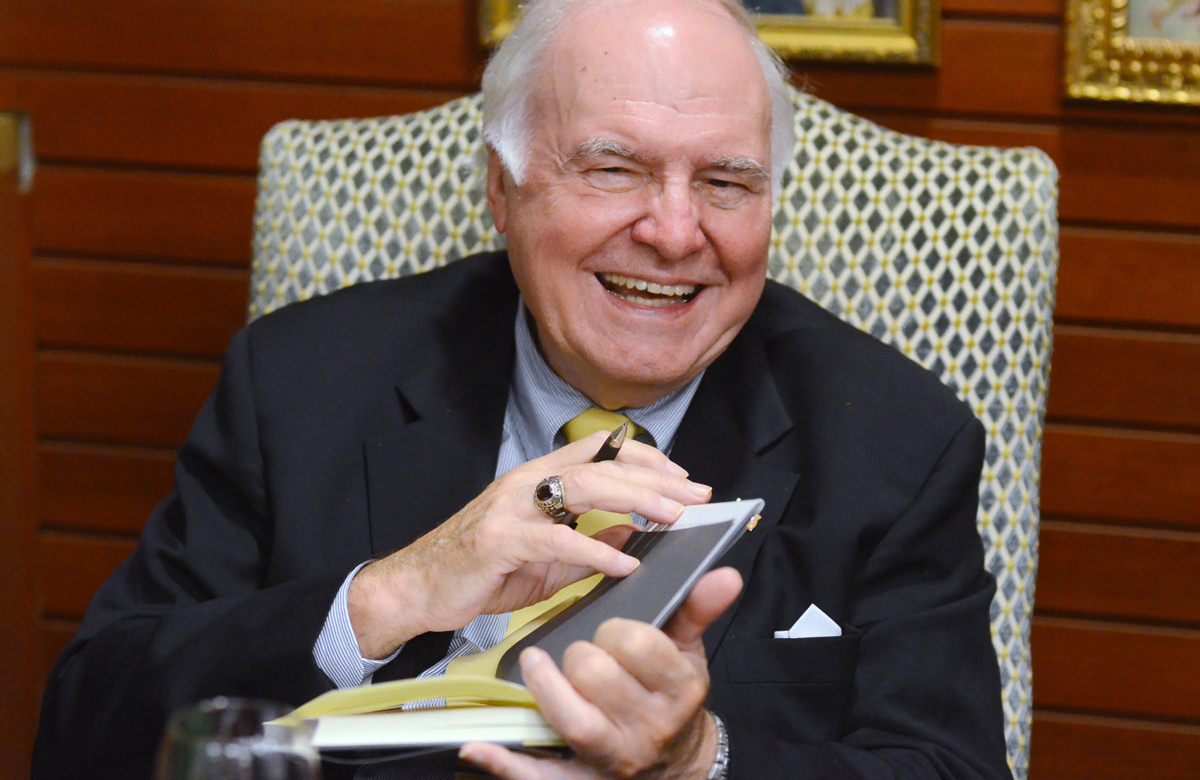Michael Novak, o gênio, o grande amigo de João Paulo II e de Ronald Reagan, o defensor do capitalismo dentro da Doutrina da Igreja, o enorme formador de opinião dentro e fora dos Estados Unidos, faleceu hoje, para minha tristeza.
Ele tinha muito ainda a nos ensinar.
Tive o inesquecível prazer de conhecê-lo pessoalmente, de trocar ideias sobre capitalismo e a Igreja, e de, o que mais orgulho, de vê-lo debater um artigo meu. Obviamente, não perdi a oportunidade, e pedi para ele autografar o livro dele que tenho.
Inesquecível.
Aqui vai minha homenagem e condolências a família, que ele tanto amava e sempre mencionava sua esposa em suas palestras.
Rezemos por ele. Descanse em paz, grande Michael Novak, o mundo sentirá muito sua falta.
Vejam texto da Catholic University.
Catholic University Remembers Michael Novak as Influential Thinker,
Prolific Writer, and Beloved Mentor

(Washington, D.C.) Michael Novak, groundbreaking
author, philosopher, theologian, and faculty member of Catholic University’s Tim and Steph Busch School of Business
and Economics since last August, is remembered at the University
as one of the country’s most influential thinkers and a mentor to business
students and faculty, among many others.
Novak, who died Feb. 17, 2017, at the age of 83,
joined The Arthur and Carlyse Ciocca Center for Principled Entrepreneurship
last year as a distinguished visiting fellow. He taught Special Topics in
Management and gave a series of lectures on campus on the topic of human
ecology.
Novak, whose 1982 book The Spirit of Democratic Capitalism changed the public conversation about the benefits
of capitalism, was awarded the Templeton Prize for Progress in Religion in
1994, and served as Ambassador to the UN Commission on Human Rights in 1981 and
1982.
Novak studied at Catholic University in 1958 and
1959 and had lectured at the University several times prior to last year’s
appointment. University President John Garvey remembered him as “a man of great
intellectual honesty.”
“Unlike some scholars, Michael Novak made it a
point to reflect on new and different topics, always with a fresh and dynamic
perspective,” Garvey said. “We are immensely grateful that he could end his
academic life as he began it, as a member of our community.”
Andreas Widmer, director of The Arthur and Carlyse
Ciocca Center for Principled Entrepreneurship, recalled Novak as a mentor and
described him as the “founding father” of the discussion about the intersection
of faith and economic activity.
“My colleagues and I have been touched by his
kindness and humility. He was quick to encourage others and was generous with
his time,” Widmer commented. “You would never have known from working with him
that this was a man who had counseled popes and changed the course of history.
It meant so much to me this past year to have Michael, who has long been a
mentor and friend, beside me as a colleague at Catholic University.”
In a 2014 address at Catholic University Novak
described the University as “a sacred place” and talked with fondness about the
faculty members he had studied under, among them Monsignor John Tracy Ellis,
Monsignor Robert Trisco, Rev. Gene Burke, Monsignor Joseph Fenton, and Rev.
Francis J. Connell.
Upon his appointment to Catholic University as a
visiting fellow, Novak commented on the University’s commitment to promote
Catholic Social Doctrine as a means to human flourishing. “If, as a
teacher you want to reach the 1.2 billion Catholics in the world, many of whom
are poor, where better to be?”
In 2006, Novak and his wife, Karen Laub-Novak,
established two scholarship funds to support philosophy graduate students, one
in his name for students working on the intersection of philosophy and religion
or public policy and one in her name for students interested in the philosophy
of beauty.
The author of more than 50 books who was highly
regarded for his religious scholarship and intellectual independence, Novak
shared his insights into the spiritual foundations of economic and political
systems and the moral ideals of democratic capitalism in syndicated columns and
innumerable lectures, articles, and commentaries.
Novak wrote on topics as varied as capitalism,
human rights, labor union history, sports, peace, families, and the role of
churches in a pluralistic world. His books have been translated into every major
Western language, as well as Bengali, Korean, Chinese, and Japanese.
He considered his greatest honor to be that Pope
John Paul II called him a friend, as did Prime Minister Margaret Thatcher and
President Ronald Reagan.
The son of Michael J. Novak and Irene Sakmar, Novak
was born on Sept. 9, 1933, in Johnstown, Pa. Discerning a call to the
priesthood, Novak entered Holy Cross Seminary of the Congregation of Holy Cross
at Notre Dame at the age of 14. He earned a bachelor’s degree in philosophy
from Stonehill College in Easton, Mass., graduating summa cum laude in 1956.
Later he earned a Bachelor of Sacred Theology at
the Pontifical Gregorian University in Rome, graduating cum laude in 1958. He
then transferred to Catholic University, where he studied for two semesters,
forming a lifelong attachment to the University.
He taught at Harvard, Stanford, Syracuse, Notre
Dame, and Ave Maria universities and was awarded 27 honorary degrees, including
one from Catholic University in 2015.
In his name, the Acton Institute, a Michigan-based
think tank, created the Novak Award, which honors outstanding scholarly
research concerning the relationship between religion, economic freedom, and
the free and virtuous society.
Three Catholic University professors have been recipients
of the award: Andrew Abela in 2009, then an associate professor of marketing
and founding dean of the school of business and economics, who now serves as
University provost; Catherine Pakaluk in 2015 who joined The Busch School
faculty a year later as an assistant professor of economics; and Maximillian
Torres in 2003 who joined the faculty as associate professor and director of
management in 2014.

Nenhum comentário:
Postar um comentário